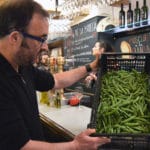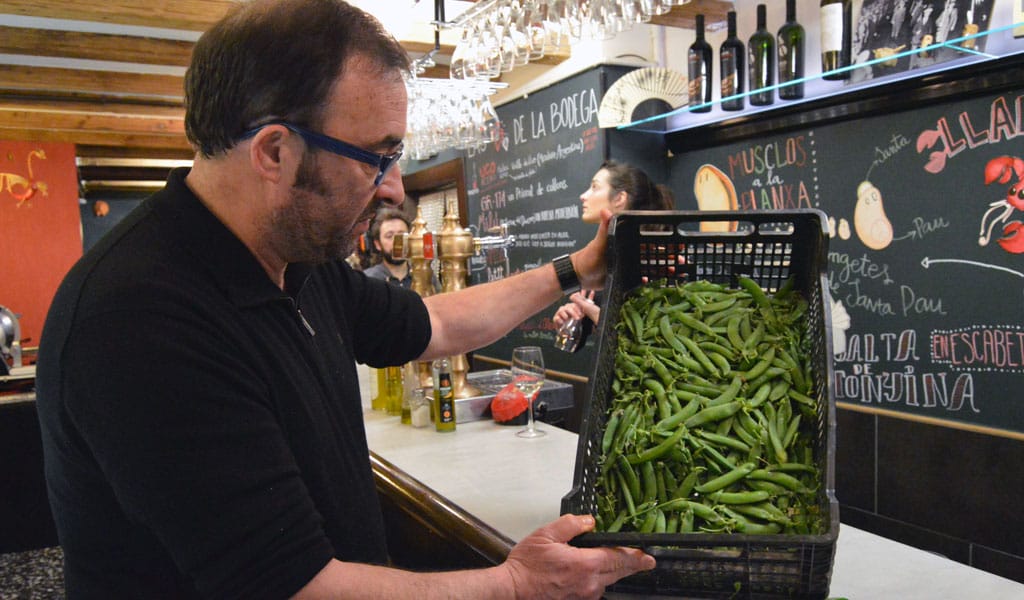Glória is a crossroads of Rio de Janeiro. It’s where the beach and bayside South Zone end before you hit the historical and commercial Centro. It’s home to the storied, luxurious Hotel Glória and the working-class favela Santo Amaro, a five-minute jog away through lines of rifle-armed soldiers meant to keep crack users at bay. There’s the state archdiocese by day, and by night, a red-light zone for legally operating transvestite prostitutes.
It comes as no surprise then that Glória’s weekly feira is one of the city’s most authentic and most colorful street markets. Like the vendors on foot on Rio’s beaches, would-be restauranteurs experiment at the feira before spreading their wings on the wider urban gastronomical scene. Here you’ll find bleary-eyed fisherman, like Gilvenal, selling the azure and violet caranguejos– crabs dangling vertically from the line and still slowly opening and closing their claws – they caught in Rio’s bay alongside peppy youngsters, like Joyce and Ezequiel, with their individualized fruit salads at the Bela Salada stand. About four-fifths of the vendors are regulars, while the remainder is freelancers who come and try to hawk their goods.
 The basics of any of the city’s feiras – the bulk vegetables and fruits, the smelly fish-on-shaved-ice stands – are found here. Our favorite “only at the feira” item is the salty queijo defumado, a smoked canastra that is the best value for cheese to be found in this city. (Mediocre white cheeses and processed ones abound for cheap prices; bries, quality parmesans and cheddars fetch a hefty price for small portions at any supermarket.) What we like at the Feira da Glória is that when you dig around, you can find specialty items, such as chemical-free strawberries farmed in the Brazilian state of Paraná, lychees from São Paulo and blueberries (elsewhere exorbitantly priced) for an acceptable 8 reais (about $2), which come from Rio’s neighboring state, Minas Gerais.
The basics of any of the city’s feiras – the bulk vegetables and fruits, the smelly fish-on-shaved-ice stands – are found here. Our favorite “only at the feira” item is the salty queijo defumado, a smoked canastra that is the best value for cheese to be found in this city. (Mediocre white cheeses and processed ones abound for cheap prices; bries, quality parmesans and cheddars fetch a hefty price for small portions at any supermarket.) What we like at the Feira da Glória is that when you dig around, you can find specialty items, such as chemical-free strawberries farmed in the Brazilian state of Paraná, lychees from São Paulo and blueberries (elsewhere exorbitantly priced) for an acceptable 8 reais (about $2), which come from Rio’s neighboring state, Minas Gerais.
The busiest joints at any feira are the stands selling pastéis, the airy fried pockets filled with meat or cheese and topped with seasoned cabbage or pepper sauce. Here, customers line up at the Pastel e Caldo de Cana de Kina food truck for its smooth bolinhos de aipim: thick, golden-fried snacks made of mashed yucca root mixed with butter and salt and filled with a creamy white cheese. For variety, there’s Alejandro’s arepas nearby. The Colombian cook came to Rio last year for the World Cup and decided to stay, serving the chewy corn patties toasted over a charcoal grill and filled with the cheese or meat of your choice. Alejandro’s stand also serves limeade, sweetened with rapadura, unrefined cane sugar that comes in a brown slab (similar to Mexican piloncillo).
The show-stealer for sweets, though, is a nearby stand selling specially made cocada. It’s a coconut treat you’ll often see sold on Rio’s streets more in the form of bark, so crystallized with sugar it becomes a teeth-cracking brick. But the small team at Kocada Assada (the second word means roasted, and also refers to the chafed feeling your skin would get if you were to, say, wear tight jeans on a hot day) makes a smoother version, far more faithful to the fruit’s natural flavor. They bake the shredded coconut in its own shell, adding passion fruit or cocoa or leaving it natural. Unlike that of the brick form, this method leaves the treat’s natural chewiness intact, and the shell container provides a nicely organic recyclable.
 We’re also taken with Jonathan, a vendor on foot who patrols the feira’s central corridor with tiny seedlings of herbs and leafy vegetables to grow in your home. He sells spinach, romaine lettuce and parsley for just 1 real, or 25 cents, a bundle. After a few minutes of hearing him make his sales pitch, you won’t be surprised to learn that his other day job is working as a clown at stoplights and on the beach.
We’re also taken with Jonathan, a vendor on foot who patrols the feira’s central corridor with tiny seedlings of herbs and leafy vegetables to grow in your home. He sells spinach, romaine lettuce and parsley for just 1 real, or 25 cents, a bundle. After a few minutes of hearing him make his sales pitch, you won’t be surprised to learn that his other day job is working as a clown at stoplights and on the beach.
At the end of the feira, there are about 200 meters of vendors selling secondhand clothes and knicknacks, mixed in with the occasional skinned chicken. What’s really on display here is the venturesome Rio work ethic, with anything-goes hustlers looking to make a few reais off items both desirable and questionable, like velvet evening gowns and black-and-white personal photos from old Rio. As the Brazilian economy contracts and the country faces what looks like it will be its worst recession since the Great Depression, we applaud that hustling spirit and believe that it will be Brazilians – rather than their quibbling representatives – who will save their own hides and come out with them tougher than ever.
 July 27, 2019 Summer Picnics
July 27, 2019 Summer Picnics
Athens, unofficially known as the Big Olive, has many delightful spots for a picnic in […] Posted in Athens June 13, 2018 Matosinhos
June 13, 2018 Matosinhos
Matosinhos, a small city just north of Porto, is used to change.
It has an industrial […] Posted in Porto April 5, 2018 Spring Fever
April 5, 2018 Spring Fever
Barcelona’s urban sprawl makes it easy to forget that the city is adjacent to two […] Posted in Barcelona
Published on July 06, 2016
Related stories
July 27, 2019
AthensAthens, unofficially known as the Big Olive, has many delightful spots for a picnic in all seasons. Okay, in summer perhaps you’d rather be on the beach – and that can be arranged if you hop on a bus or tram for the southern coastal suburbs of Voula, Vouliagmeni and Varkiza – but in the…
Sample some of Porto’s seafood delicacies on our walk!
June 13, 2018
PortoMatosinhos, a small city just north of Porto, is used to change. It has an industrial air to it, due to its 19th-century harbor, and its past prosperity was connected to the fish-canning sector, which peaked during World War II and declined from the beginning of the 70s. The numerous abandoned warehouses attracted nightlife during…
Come see what Spring is all about, on our Sants tour.
April 5, 2018
BarcelonaBarcelona’s urban sprawl makes it easy to forget that the city is adjacent to two fertile regions to the north and south, El Maresme and El Baix Llobregat, which provide numerous hyperlocal culinary treasures throughout the year. In spring as in other seasons, these treasures appear at markets and restaurants, their origins proudly displayed, sometimes…








































 The basics of any of the city’s feiras – the bulk vegetables and fruits, the smelly fish-on-shaved-ice stands – are found here. Our favorite “only at the feira” item is the salty queijo defumado, a smoked canastra that is the best value for cheese to be found in this city. (Mediocre white cheeses and processed ones abound for cheap prices; bries, quality parmesans and cheddars fetch a hefty price for small portions at any supermarket.) What we like at the Feira da Glória is that when you dig around, you can find specialty items, such as chemical-free strawberries farmed in the Brazilian state of Paraná, lychees from São Paulo and blueberries (elsewhere exorbitantly priced) for an acceptable 8 reais (about $2), which come from Rio’s neighboring state, Minas Gerais.
The basics of any of the city’s feiras – the bulk vegetables and fruits, the smelly fish-on-shaved-ice stands – are found here. Our favorite “only at the feira” item is the salty queijo defumado, a smoked canastra that is the best value for cheese to be found in this city. (Mediocre white cheeses and processed ones abound for cheap prices; bries, quality parmesans and cheddars fetch a hefty price for small portions at any supermarket.) What we like at the Feira da Glória is that when you dig around, you can find specialty items, such as chemical-free strawberries farmed in the Brazilian state of Paraná, lychees from São Paulo and blueberries (elsewhere exorbitantly priced) for an acceptable 8 reais (about $2), which come from Rio’s neighboring state, Minas Gerais. We’re also taken with Jonathan, a vendor on foot who patrols the feira’s central corridor with tiny seedlings of herbs and leafy vegetables to grow in your home. He sells spinach, romaine lettuce and parsley for just 1 real, or 25 cents, a bundle. After a few minutes of hearing him make his sales pitch, you won’t be surprised to learn that his other day job is working as a clown at stoplights and on the beach.
We’re also taken with Jonathan, a vendor on foot who patrols the feira’s central corridor with tiny seedlings of herbs and leafy vegetables to grow in your home. He sells spinach, romaine lettuce and parsley for just 1 real, or 25 cents, a bundle. After a few minutes of hearing him make his sales pitch, you won’t be surprised to learn that his other day job is working as a clown at stoplights and on the beach.








































